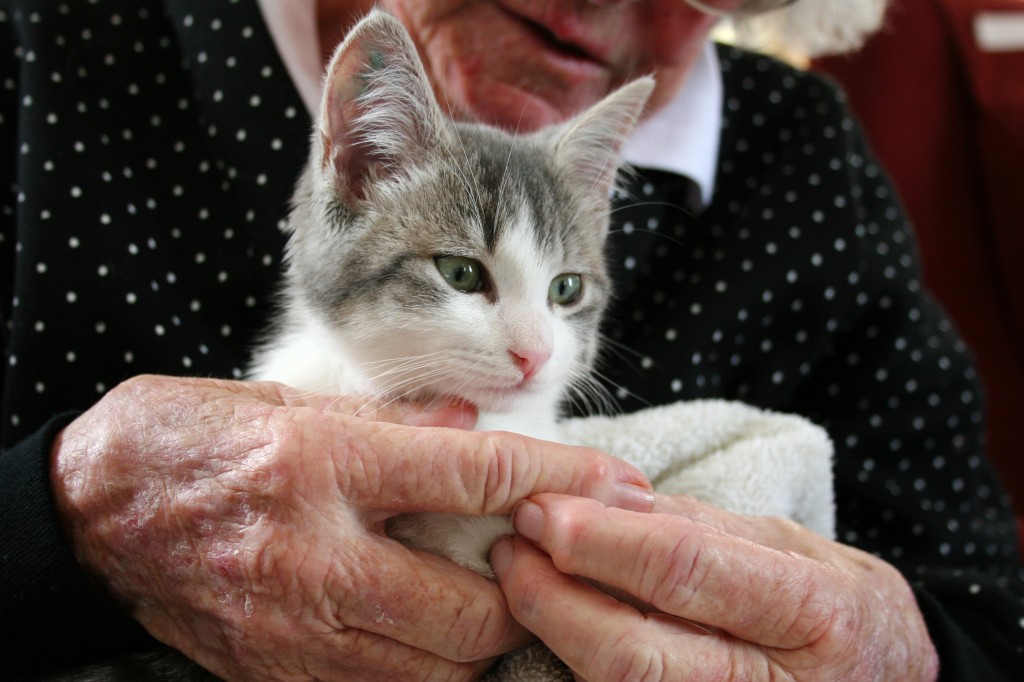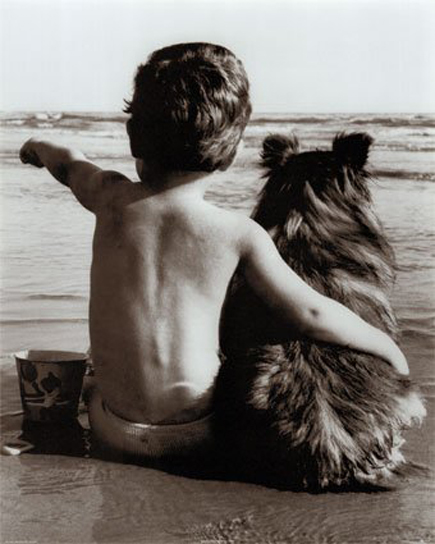Supporting Aged Care Residents and Pets through the
2014 AWLA Pets in Aged Care Grants Program
The human-animal bond can make a powerful difference to the lives and well-being of people of all ages - and it can have a particularly positive and meaningful impact for older people transitioning into aged care accommodation and the next stage of their lives.
Breaking the human-animal bond apart when an older person is going into care can have a considerable impact for both resident and pet. Separating elderly residents from their animal companions when their pets cannot be accommodated in aged care facilities can lead to significant grief at a time already marked by a profound sense of loss and sadness, and lead to a range of health problems, sleep and appetite disturbances and integration difficulties.
Some elderly people in the community who can no longer care for themselves are unwilling to leave their homes because they are not permitted to take their pets with them to supported accommodation. Outcomes for their animals vary, with some animals re-homed, others surrendered to shelters and some euthanased.
 In recognition of the vital role companion animals can play in the lives of aged care residents and the ongoing costs associated with keeping companion animals in aged care facilities, Animal Welfare League Australia developed the AWLA Pets in Aged Care Grants Program - a small grants funding program designed specifically to support aged care residents and their pets.
In recognition of the vital role companion animals can play in the lives of aged care residents and the ongoing costs associated with keeping companion animals in aged care facilities, Animal Welfare League Australia developed the AWLA Pets in Aged Care Grants Program - a small grants funding program designed specifically to support aged care residents and their pets.
The program aims to provide residents with the practical means to cover costs, such as vet bills, grooming, dog walking, feeding, carer support, infrastructure projects or making minor modifications and additions to living quarters and communal areas to enable live-in arrangements.
Earlier this month, we were thrilled to announce the successful recipients of the inaugural AWLA Pets in Aged Care Grants. The grants will go toward a range of innovative and essential pet projects and costs to support aged care residents and their pets in aged care facilities across Queensland, New South Wales and Victoria.
Click here for the full list of 2014 AWLA Pets in Aged Care Grant recipients and projects.
The AWLA Pets in Aged Care Program is part of our broader AWLA Positive Ageing in the Company of Animals Project, which is working to identify successful models for keeping aged care residents and their pets together. As part of our ongoing commitment to supporting the human-animal bond and advocating for the rights of aged care residents to have companion animals, we will be soon be launching an online resource bank for aged care providers and older pet owners.
You can find out more about the AWLA Positive Ageing in the Company Project here.
Speak Up About Animal Testing in Cosmetics
As committed pet owners and lovers, we work hard to make sure our companion animals receive the very best that humans have to offer: nutritious food, adequate shelter, comfortable bedding, thorough grooming, regular exercise and plenty of cuddles.
Sadly, not all animals receive the same loving treatment from their human counterparts. Every year thousands of animals in laboratories around the world experience the very worst that humans have to offer: invasive and painful procedures for the sake of the human beauty industry.
Testing cosmetic products and ingredients on animals is both ethically unacceptable and unnecessary, with a large number of existing ingredients already certified safe for human use, and approved tests available to the industry which do not require testing to be carried out on animals.
While legislation prevents cosmetic testing from taking place within Australian laboratories, many products and ingredients that have been tested on animals around the world still find their way on to Australian shores and into Australian stores, shopping trolleys and homes.
Public and political support to put an end to cosmetics and cosmetic ingredients tested on animals is strengthening across the globe. Bans on animal testing have already been enacted by the EU, and China and the United States are in the process of developing similar legislation.
Potential change is also afoot here at home. The Australian Greens introduced the End Cruel Cosmetics Bill 2014 to Federal Parliament earlier this year, while the Australian Labor Party has instigated a national consultation on phasing out the importation, manufacture, sale and advertising of cosmetics and cosmetic ingredients tested on animals. The consultation process is open to all Australian with written submissions due by 29 August 2014
Animal Welfare League Australia (AWLA) acknowledges political commitment to this critical animal welfare issue and strongly supports a ban on the importation, manufacture, sale and advertising of cosmetics and cosmetic ingredients tested on animals.
Animals can’t speak up for themselves – but we can stand up and speak on their behalf.
TAKE ACTION and make a contribution to the Cosmetics & Animal Testing Policy Consultation today. Hurry, you only have to 29 August to have your voice heard.
It’s no secret that Australians love their companion animals. Research from the Animal Health Alliance shows that more than 63 percent of Australian households own an estimated 33 million pets, and that they spend a collective $8 million looking after them each week – a sure sign of the strong human-animal bond Aussies share with their pets.
Unfortunately, this loving bond doesn’t always stretch to having their pet desexed, or spayed as it sometimes known. Despite wanting the best for their furry friends and being aware of the many health benefits for pets that can result from the procedure, some pet owners still hesitate to have their pets desexed.
There are a number of reasons why pet owners avoid having their pets desexed. Many pet owners believe desexing is important but don’t think they need to get their own cat or dog desexed because they are always kept indoors or on a leash. While this decision makes sense on the surface, desexing can still bring many benefits for indoor pets and their owners. Desexing indoor felines eliminates the unpleasant spraying that male cats will do indoors and reduces the crying sounds that female cats make when they are in heat.
Desexing also plays an important role for indoor dogs and their owners. We all know male dogs will do just about anything to get to a prospective mate. A male dog confined indoors is likely to try and escape to follow his natural instincts, increasing the risks he will roam the streets and get hit by a car, get lost or end up in the wrong hands, while having a female dog on heat in a confined space can bring behavioural changes and bleeding in the house. Desexing can eliminate and reduce these issues, making life much less stressful (and messy) for inside dogs and their human companions and also reduce the risk of indoor dogs developing prostate diseases, testicular cancer, uterus infections and mammary tumours.
Many pet owners want to have their pet desexed but worry the procedure will change their pet’s personality. This widespread myth is just that – a myth. Desexing will not change your pet’s basic personality, although it may lead to improvements in behaviour, playfulness, happiness and focus.
Some pet owners don’t have their pets desexed because they believe their pets are too young for the procedure, whereas early age desexing is readily available and the surgical procedure is actually less stressful on a younger pet. If the surgery can be carried out by the time a pet is four months old, it reduces many health risks and prevents the animal from contributing to pet overpopulation.
Perhaps one of the most common reasons cited by owners for skipping the desexing procedure is the cost of the surgery itself and the impact vets bill will have on their hip pocket. Desexing surgery does come with a cost attached, but popular discount desexing programs, like National Desexing Month which kicks off in July, can help bring the cost of desexing within reach and make surgery more affordable for pet owners. For more information about National Desexing Month, visit www.ndn.org.au
Companion Animal Network Australia is a proud supporter of National Desexing Month and strongly advocates for the desexing of companion animals. Find out more about our policies on desexing.

Welcoming an unwanted animal into your family is a decent and rewarding decision. If you have the time, resources and lifestyle to give an animal a loving and permanent home, adopt from a shelter or rescue organisation. Adopted pets can make the best companions and our affiliated shelters receive thousands of letters, emails and photos from happy families enjoying life with their adopted pets – here’s just one of them.
Shelters have mixed and pure bred animals in need of permanent and loving homes and can provide useful information about their health and personality. Adopted pets are already vaccinated, de-sexed, micro-chipped and vet checked - a real saving. Animals in need of new homes are not 'bad or naughty', just unlucky in the lottery of life.
Animal adoption is a powerful and practical way to improve animal’s lives. To find out more about Animal Welfare League Australia's position on animal adoption, visit www.awla.org.au/aboutawla/policies.


